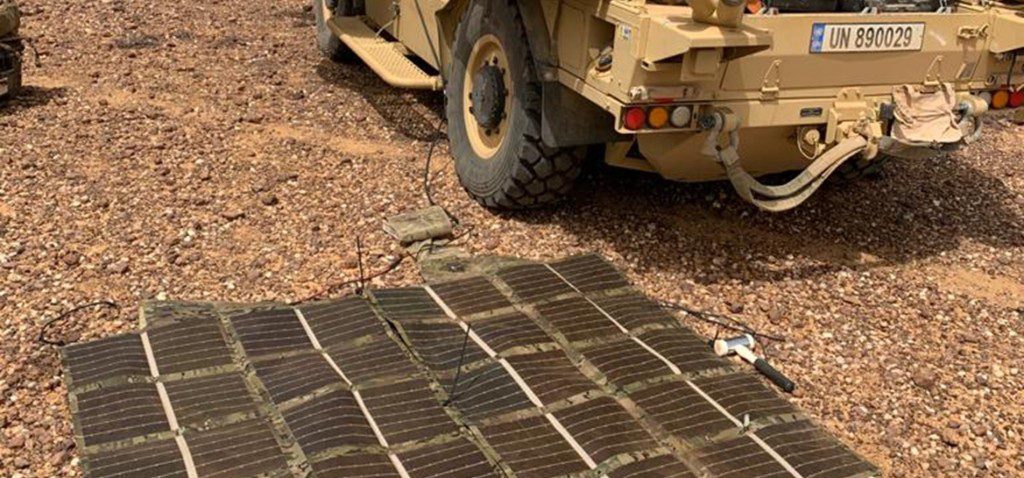Electric vehicles, solar panels and portable power banks are just three of the ongoing projects the Army is working on to become more sustainable in the fight against climate change.
Green initiatives and sustainable considerations are embedded into all the decision-making areas across Defence.
New hybrid technology is being tested on the Army’s MAN SV Foxhound and Jackal vehicles that will reduce reliance on fossil fuel.
Offering improved silent mobility, the hybrid electric systems will provide sustainability benefits and enable the vehicles to operate the latest technologies whilst reducing noise and increasing stealth capability.
The Army is also pioneering power solutions for soldiers operating in the most austere environments where access to power is limited or non-existent. Soldiers deployed on Operation Newcombe in Mali have been testing various sustainable power bank prototypes whilst on patrol.
Some of the power banks being tested are methanol generators or Lithium-Ion batteries paired with solar panels, which are ideal for supplementing power for a patrol base. In combination, they can be deployed by two people in under a minute and can power a headquarters, including communication equipment using only a tiny portion of fuel.
Over the last 12-months the Army has launched defence’s first photovoltaic solar farm at the Defence School of Transport in Leconfield.
It was the first of four pilot sites delivered as part of Project Prometheus to increase renewable energy across the defence estate and support the Government’s commitment to meeting net-zero carbon emissions by 2050.
The three further pilot schemes are at Rock Barracks, Suffolk, Baker Barracks on Thorney Island in Sussex and the Duke of Gloucester Barracks, South Cerney.
When completed the four schemes will result in £1-million in efficiency saving and reduce emissions by 2,000 tonnes of carbon dioxide equivalent a year.
Work on the solar farm at South Cerny commenced in June. It will be the size of four football pitches and is expected to supply the barracks with one third of its electricity needs.
There is also an aspiration to deliver a further 80 solar farms across the Army estate over the next seven years.
June this year saw the official opening of net-zero carbon buildings at Nesscliffe Training Camp. It followed the opening of net-zero carbon buildings at Westdown Camp on Salisbury Plain in 2020. The Nescliffe buildings have an Energy Performance Certificate rating of -5 thanks to solar panels on the roof, air source heat pumps and a heat recovery system in the showers and drying rooms. This means they will generate power for the site, reducing electricity costs.
The buildings are equipped with SMART building technology, which provides detailed information on how the building is being used, its hot water usage and occupancy rates. This enables the Defence Infrastructure Organisation to monitor the energy demands of the building and see how it can be optimised so that zero-emissions – or as close as possible – can be achieved.
The Net-Zero Carbon Accommodation Programme will also see new carbon-efficient blocks being built at Castlemartin Training Area in Pembrokeshire and Brunswick Camp in Surrey.
Construction of the first solar powered carport has begun at Army Headquarters in Andover in August. The 40-space car park with 10 double chargers for up to 20 Ultra Low Emission Vehicles will be completed in November 2021.
Military personnel from the British Army Training Support Unit Belize (BATSUB) have worked in partnership with environment advisors from the Defence Infrastructure Organisation (DIO) to plant 57 fruit tree saplings of various types.
The positive impact the tree planting has had on the environment and its wildlife was demonstrated when Black Howeler monkeys and Spider monkeys were seen returning to live in the area.
Other environmental projects in Belize include an orchard of over 200 fruit trees including mango, custard apple and soursop, that have been planted in a joint effort by staff from the Belize Defence Force, BATSUB staff, DIO environmental team and their families.
BATSUB has also been working with Panthera, an organisation devoted to mammalian conservation, to develop a monitoring strategy to record wildlife in and around the live firing ranges and assess any impact on the animals.
These projects form part of the Army’s mission to protect our nation and its people. There is still more to do, and the Army continues to look at and invest in innovative ways to become greener as it plays its part in helping the UK achieve its goal of net zero carbon emissions by 2050.






